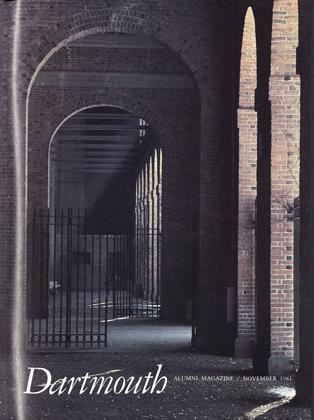The ongoing debate on the role of fraternities and sororities in the life of the College, more or less quiescent of late, received a shot in the arm last month with a proposal submitted by Paul Mahoney 65, president of the Beta Theta Pi Corporation, that the College take over control of physical facilities of the houses under longterm leases, in exchange for facilitating greater financial support.
The purpose, as Mahoney informed Dean Manuel, was "to revitalize the fraternities and sororities and to enhance their positive contributions as an integral part of campus residential life." Whether or not the proposal will ultimately accomplish that objective, it undeniably revitalized the debate to a peak not reached since the faculty, to almost universal surprise, approved Professor James Epperson's 1978 resolution to abolish fraternities. (The trustees, instead of abolishing the fraternities, gave them a reprieve.)
In brief, the Mahoney plan calls for the College to lease the premises of participating houses from the corporations and then to sublease individual rooms to student occupants—in the same manner as it does dormitory rooms—and common rooms and exterior grounds back to the corporation, provided that that common space would be made available with specified frequency for approved College functions open to nonmembers. The College would collect house dues, parking fees, social fees (if requested), and room rentals and pay the house bills. It would provide routine maintenance of buildings and grounds and would set up a fund through which alumni could make tax-deductible contributions to support College-approved educational programs or facility improvements. Ninety per cent of the alumni contributions would go to the designated houses, with the other ten per cent being allocated by the dean of the College.
Participation in the program would be voluntary for privately owned houses in good standing, mandatory for others as a condition of being restored to good standing: All fraternities and sororities occupying College-owned houses would be required to participate.
Although the proposal was a "grassroots" effort originated by alumni and corporation officers, Mahoney said that the group had kept College officials informed of the particulars all along the way. Cooperating in early drafts of the proposal were fellow Betas Robert Bartles '64, former head of the fraternity governing board, and Ronald Schram '64, since June a trustee of the College. Schram withdrew entirely from his involvement, Mahoney said, as soon as his trustee candidacy arose, to avoid any appearance of conflict of interest.
The final 11-page draft was sent to Manuel on October 1, with a long covering letter and a request that the dean call a meeting of fraternity corporation officers for Sunday, October 11, to discuss the plan and solicit their support.
Reaction on the part of the undergraduates was swift and vehement. Robert Charles '82, chairman of the Interfraternity Council, pronounced himself "stunned" on first hearing of the proposal at the October 5 council meeting. "I am extremely disappointed in the way I had to learn about this, and I'm outraged that Dean Manuel didn't inform me or the council," he told The Dartmouth' reporter the following day. "Stop the railroad," fumed an editorial writer for the student daily later in the week. Both the Interfraternity Council and the Undergraduate Council passed resolutions in opposition, and the I.F.C. submitted a 25-page rebuttal.
Mahoney expressed both surprise and alarm at what he called the students' "overreaction." He denied any attempt to bypass the I.F.C., students, or the faculty, adding that "all these groups would have a chance for input later in the process." With hindsight, he said later, "perhaps the students were offended by the tone, which might inadvertently have seemed to imply that the fraternities had made little progress."
After the October 11 meeting with house presidents and members of the I.F.C., the corporation officers referred the Mahoney proposal to the Fraternity Board of Overseers, with the charge that they report their recommendations back to both the undergraduate and the corporation officers within three months.
"Our job," said overseer chairman Robert Murphy '65, "is to bridge the gap between the Beta proposal and the I.F.C. response in some way that is acceptable to both the undergraduates and the alumni. We would certainly like to find some way to channel College money into the fraternity system in such a way as not to infringe on the liberty of the fraternities."
Charles expressed satisfaction after the meeting. "The Mahoney proposal, in its present form," he said, "is now history."
 View Full Issue
View Full Issue
More From This Issue
-
 Feature
Feature"Now we had to go in different directions"
November 1981 By Rob Eshman -
 Feature
FeatureA record of their fame
November 1981 By Eddie O'Brien -
 Feature
FeatureB & G
November 1981 -
 Article
ArticleMaster Carpenter, Journeyman Blackmailer
November 1981 By Shelby Grantham -
 Class Notes
Class Notes1959
November 1981 By William G. Long -
 Class Notes
Class Notes1961
November 1981 By Robert H. Conn
Article
-
 Article
ArticleSENIOR CLASS ELECTIONS
April, 1912 -
 Article
ArticleHONORS TO CIVIL WAR VETERANS
November 1921 -
 Article
ArticleDartmouth Men Who Received Honorary Degrees at 164th Commencement
October 1933 -
 Article
ArticleMiss Gilmore Resigns
December 1946 -
 Article
ArticleAlumnus and Wife Win Architecture Prize
June 1947 -
 Article
ArticleClub Calendar
JANUARY/FEBRUARY 1986


